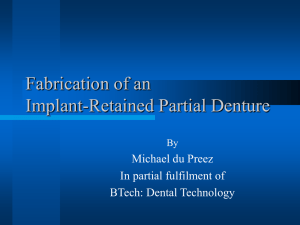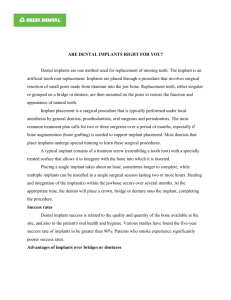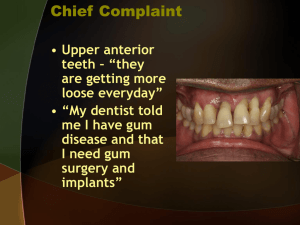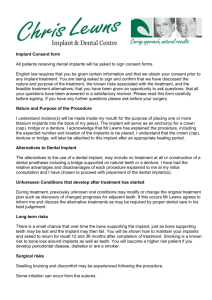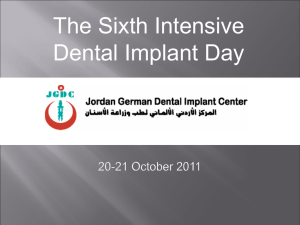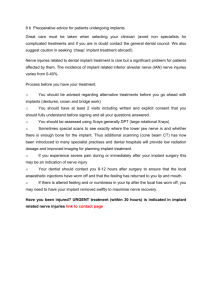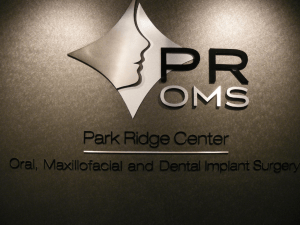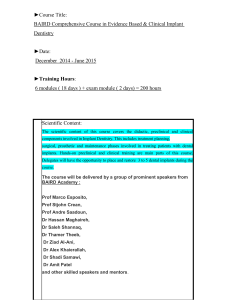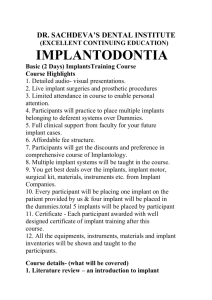a word about your smile - Hills Dental & Implant Centre
advertisement
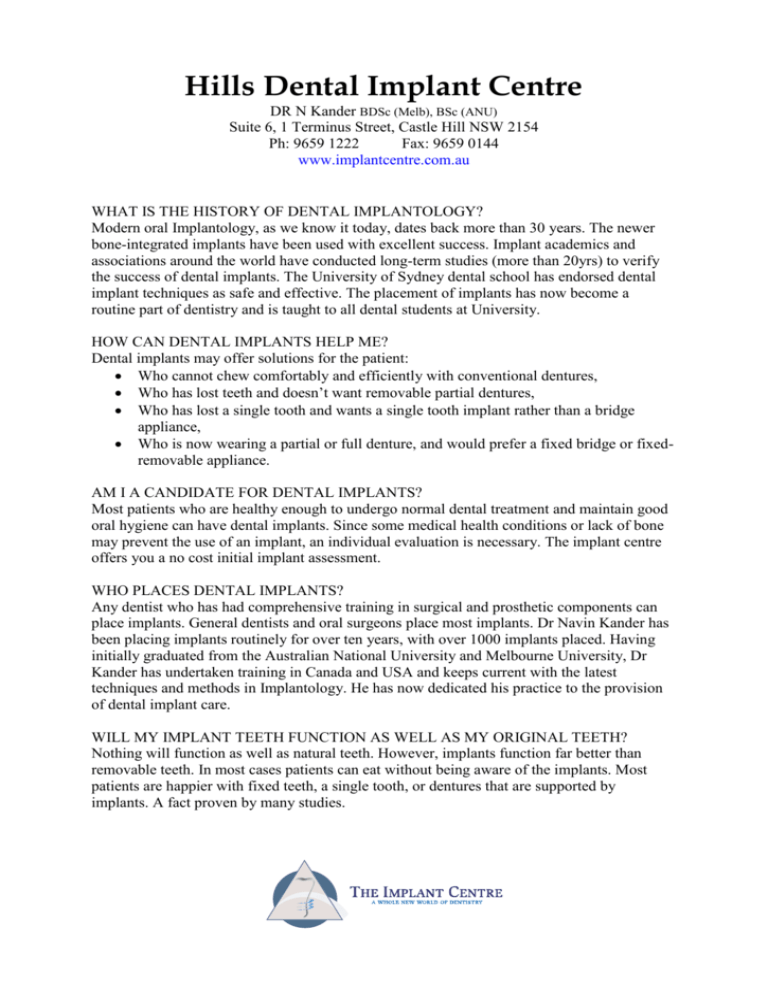
Hills Dental Implant Centre DR N Kander BDSc (Melb), BSc (ANU) Suite 6, 1 Terminus Street, Castle Hill NSW 2154 Ph: 9659 1222 Fax: 9659 0144 www.implantcentre.com.au WHAT IS THE HISTORY OF DENTAL IMPLANTOLOGY? Modern oral Implantology, as we know it today, dates back more than 30 years. The newer bone-integrated implants have been used with excellent success. Implant academics and associations around the world have conducted long-term studies (more than 20yrs) to verify the success of dental implants. The University of Sydney dental school has endorsed dental implant techniques as safe and effective. The placement of implants has now become a routine part of dentistry and is taught to all dental students at University. HOW CAN DENTAL IMPLANTS HELP ME? Dental implants may offer solutions for the patient: Who cannot chew comfortably and efficiently with conventional dentures, Who has lost teeth and doesn’t want removable partial dentures, Who has lost a single tooth and wants a single tooth implant rather than a bridge appliance, Who is now wearing a partial or full denture, and would prefer a fixed bridge or fixedremovable appliance. AM I A CANDIDATE FOR DENTAL IMPLANTS? Most patients who are healthy enough to undergo normal dental treatment and maintain good oral hygiene can have dental implants. Since some medical health conditions or lack of bone may prevent the use of an implant, an individual evaluation is necessary. The implant centre offers you a no cost initial implant assessment. WHO PLACES DENTAL IMPLANTS? Any dentist who has had comprehensive training in surgical and prosthetic components can place implants. General dentists and oral surgeons place most implants. Dr Navin Kander has been placing implants routinely for over ten years, with over 1000 implants placed. Having initially graduated from the Australian National University and Melbourne University, Dr Kander has undertaken training in Canada and USA and keeps current with the latest techniques and methods in Implantology. He has now dedicated his practice to the provision of dental implant care. WILL MY IMPLANT TEETH FUNCTION AS WELL AS MY ORIGINAL TEETH? Nothing will function as well as natural teeth. However, implants function far better than removable teeth. In most cases patients can eat without being aware of the implants. Most patients are happier with fixed teeth, a single tooth, or dentures that are supported by implants. A fact proven by many studies. WHAT ARE THE RISKS OF DENTAL IMPLANTS? Dental implants are subject to the normal complications associated with any surgical procedure in the mouth. Possible complications include discomfort, cosmetic problems, Implant breakdown and damage to the adjacent teeth in the mouth. Fortunately, these problems are rare, especially with periodic checkups and the high level of care given to each patient. ARE THERE PROBLEMS ASSOCIATED WITH SMOKING? Smoking is extremely harmful to all oral tissues, especially when implants are present. Irritants from smoking also effect the normal healing of the gum and bone tissues of the mouth. Smoking robs the bone and other tissues of vital nutrients and minerals needed for healing and maintaining the healthy bone connection to the implant. Smoking also decreases the blood supply and oxygen to the gums and bone tissues that are next to the implant. CAN AN IMPLANT BE REPLACED? Depending on the reason for its removal, an implant can often be replaced. After healing, if adequate bone is present and the gum tissue is adequate, a new implant can be inserted. HOW LONG DOES THE TREATMENT TAKE? A basic requirement of implant surgery is enough time for adequate bone healing. This is usually from three to six months. During this time the implants are usually under the gum tissue (occasionally they are above the gums). During this time the implant is healing in contact with the surrounding bone. A temporary appliance can usually be made which will be functional, comfortable and aesthetic. After healing of the implant in the bone the prosthetic phase of treatment can be continued. In some cases this can take from a few weeks to a few months. DOES IT HURT TO HAVE DENTAL IMPLANTS PLACED? The actual procedure to surgically place a dental implant is done under local anaesthesia and is generally not at all painful. When the anaesthetic wears off about three or four hours later, you might experience some discomfort. The level of discomfort is quite different from patient to patient, but most patients do have varying degrees of pain or discomfort, which may last for several days. Swelling and bruising may also develop. HOW LONG DO IMPLANTS LAST? This depends very much on where the implants are placed and what they will be called upon to do and how well you maintain your oral hygiene. The best case scenario is the placement of implants in the front portion of the lower jaw. Here success can be as high as 98-100%. In other areas of the mouth, success rates can drop. According to figures we have today, the success of implants in the front part of the upper jaw are anywhere from 90-95%. Success rates of implants in the back part of the upper and lower jaw can be in the 85-95% range. The success rate in my practice for the past five years has been 97+% for all implants placed. HOW SOON MAY I BEGIN USING MY NEWLY IMPLANTED TEETH? Once your implants have been completed, you may immediately start using them. Most people find that eating, talking and general disposition is better than having conventional dentures. Implants take 3-4 months to fuse to your bone. WHAT ARE THE CHANCES OF REJECTION OF THE IMPLANT? The body does not reject a dental implant as it might a heart, lung or kidney. Infection is a concern with dental implants leading to failure of approximately 2% of cases. Good oral hygiene can greatly reduce this risk. WHAT KIND OF FOLLOW-UP CARE IS NEEDED? GOOD ORAL HYGIENE. Your implants can fail for the same reasons that your natural teeth are lost. Poor oral hygiene is the greatest cause of implant failure. The build-up of dental plaque and debris around teeth and implants cause an increased concentration of bacteria and the destruction consequences of inflammation and infection. This will lead to swollen gums and loss of bone that is needed to support the implant. Excellent oral hygiene is necessary and vital to long-term success of the implant-supported crown, bridge, and fixed or removable dental appliances. FREQUENT VISITS TO YOUR DENTIST. Frequent visits to your dentist are an important part of your commitment to the success of your implant procedure. Your dentist and his staff will instruct you in the proper use of toothbrush and other oral hygiene aids. In the morning and before bedtime, you must brush and clean around the implants and the supported appliance. The dentist may also need to clean around the implant(s) and also check the health of the supporting bone tissues by examination and x-rays. WHEN CAN I START? If you feel that you may be a candidate for dental implants, call the Implant Centre and arrange a no cost initial appointment. Following this appointment Dr Kander will assess your suitability and provide you with a written estimate of fees and options. Dr. N. Kander BSc (ANU) BDSc (Melb) Member of: Australian Society of Implant Dentistry International Congress of Oral Implantologists Clinical Associate (University of Sydney) Australian Dental Association A WORD ABOUT YOUR SMILE IT HAPPENS IN A FLASH, BUT CREATES MEMORIES THAT CAN LAST A LIFETIME. ITS VALUE IS PRICELESS, BUT ONLY WHEN SHARED. IT BRIGHTENS THE LIVES OF ALL WHO RECEIVE IT, WHILE ENRICHING THOSE WHO GIVE IT AWAY. A GREAT SMILE, IT TAKES SO LITTLE BUT GIVES SO MUCH Call (02) 9659 1222 NOW For a new smile!
